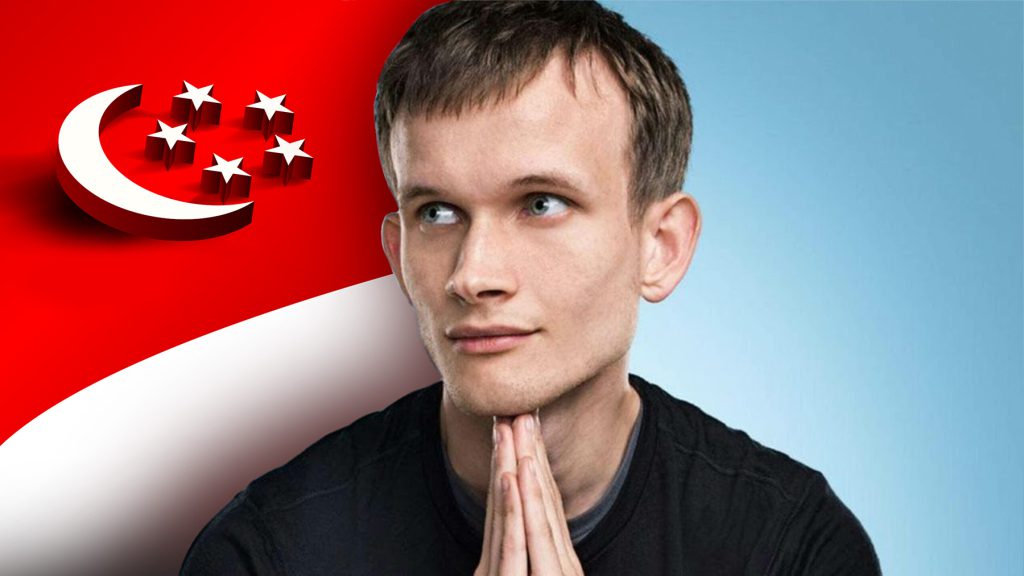Disclaimer: Opinions expressed below belong solely to the author.
In a “Lunch with Sumiko” episode published yesterday, Straits Times Executive Editor Sumiko Tan spoke with Vitalik Buterin who, as it turns out, tends to spend quite a lot of his time in Singapore (more in the video).
But the co-founder and face of Ethereum, though weighing his words, questioned the approach of trying to separate the blockchain technology from cryptocurrencies, which regulators — like the Monetary Authority of Singapore (MAS) — see as speculative in nature and dangerous.
Here’s what he said:
Trying to make a distinction between blockchain usage and cryptocurrency is one of those weird things, right? On the one hand, it’s sort of the mindset that every regulator has.
You want to be supportive of technology and making things easier for people but, you know, you find cryptocurrency weird and scary. But, on the other hand, [blockchain and] cryptocurrency do have this tight connection with each other. You can’t really have one without the other.
The reality is if you don’t have cryptocurrency, then the blockchains that you’re going to have are just fake and nobody is going to care about them.
– Vitalik Buterin, co-founder of Ethereum
But is this true? The answer is both yes and no.
Decentralisation…
Since the interview was not particularly in-depth on the topic, we have to assume that Vitalik was referring to the mainstream use of the blockchain for, fundamentally, the economic exchange of value. There are, after all, blockchain applications which do not rely on cryptocurrencies, and offer a new way of tracking and validating business transactions or medical records.
The thing about the use of blockchain for financial transactions however, is that the chief change this new technology promotes is decentralisation — i.e. departure from traditional institutions, government, regulators etc.
For the entire system to run, you need to have enough participants willing to either put their computational power to use (proof-of-work) or stake their coins (proof-of-stake) in return for a reward.
Without the reward, the independent blockchain would simply not function. In other words, for decentralisation to happen you need a sort of self-financing, self-sufficient community that supplants the central authority with a set of rules ensuring security for all.
The question is, however, do we really want that?
Now, undoubtedly, if you’re Vitalik Buterin, you don’t — and however diplomatic you may be in your statements, any attempts of centralised regulation that would try to constrain or control cryptocurrencies are unacceptable (both practically and ideologically).
That’s not to say he is not supportive of some regulation, recognising the inherent risks of bad people doing bad things (he even once invoked Singaporean labour legislation during the Terra Luna collapse, as an example of a safety net that could be a model for similar protections of cryptocurrency users should similar meltdowns happen in the future).
The thing is, however, that regulators do not want decentralisation — and I believe most people do not either.
What we really want are safer, faster, convenient transactions, that’s all. We don’t really care how it is achieved.
There is, of course, a certain libertarian subset in every society which is suspicious of the government and believes only by abandoning the rule of law we can break our shackles off, but I’m willing to wager it’s a tiny minority.
Decentralised blockchain-based cryptocurrencies are not necessary for the achievement of security, speed or convenience for the masses.
…is the new centralisation
When Vitalik Buterin questions separation of the two, he’s fundamentally acting in his own self-interest, which is divergent not only from that of national regulators but, I believe, the society at large as well.
Just as I write these words, the infamous FTX hacker has been dumping the stolen coins he earlier shifted to Ether, sinking the price of the second largest digital currency by seven per cent within mere hours.
This happens as we’re feeling the pinch of a seven per cent annual inflation — which is equivalent to the currency you’re being paid in dropping by just as much, pushing the prices of goods and services up by as much (particularly imported ones).
This sort of fluctuation is simply unacceptable in any medium used for financial transactions, as it would make our once-in-a-decade crises become a monthly or weekly occurrence.
The irony, of course, is that by moving Ethereum to proof-of-stake instead of power-hungry proof-of-work system, Vitalik and his colleagues inadvertently (or maybe deliberately?) pushed the entire system towards greater centralisation, in which those who boast the highest ownership of Ether get to reap the biggest rewards and their position cannot be challenged unless they wish to sell their stake — or, in the case of exchanges which attract individual users with rewards of their own — dismantle the entire profitable system giving them considerable influence.

I think if Vitalik wants to foster truly mass adoption of crypto, he has to first convince us that the technology can achieve stability and predictability of traditional fiat currencies, before he wants to take on the regulators.
And that it’s not going to push us towards oligarchy of the token-owning elite over, however imperfect but still largely elected, governments.
Because, as it is, the only reason for the crypto frenzy that took over the world in the past two years was the belief that digital tokens could make you a millionaire in days or months, if you got in and out at the right time — not the appeal of technological innovation which, let’s be honest, few people even understand.
Featured Image Credit: about.me/vitalikbuterin (edited)










